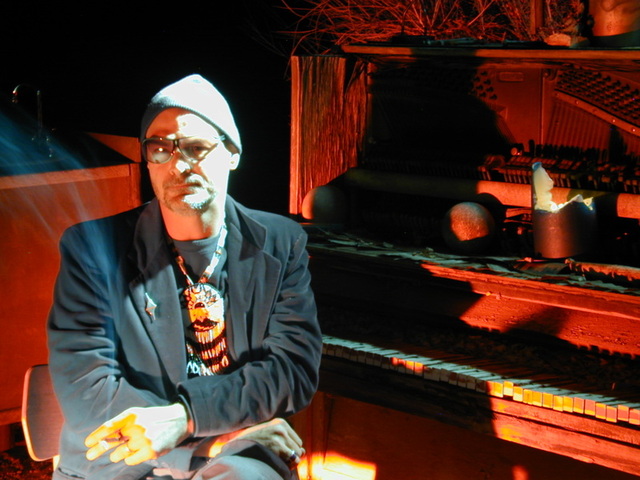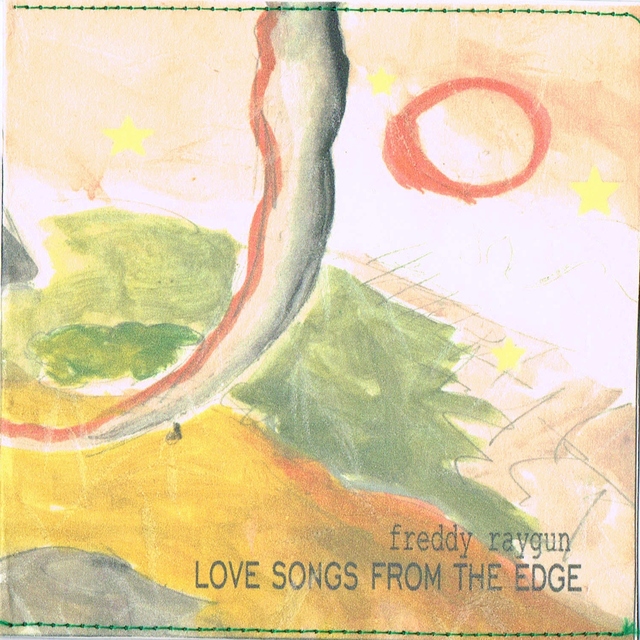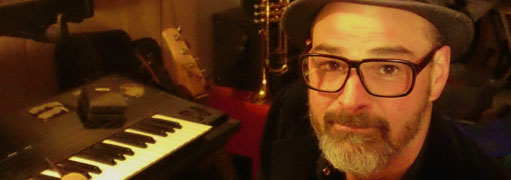The coming year marks Freddy Raygun’s fifteenth making music here in Burque. He’s marking that occasion by releasing a long-awaited album, Love Songs from the Edge, on Little Kiss Records. This makes me happy. What makes me unhappy is that very few of you have heard or even heard of him—or of Little Kiss Records.Little Kiss is/was—it’s complicated—a loose conglomeration of other little-known local artists, all of, shall we say, a distinctive nature. The Little Kiss roster may not have ready commercial potential but all possess singular talent and outlook. There’s the smoldering-cigarette-in-an-ashtray twang of southeastern New Mexican Jasper Brown. Take the lethargic y’all-ternative music of Shine Cherries, with Michelle Collins’ ethereal vocals and the multi-talented Jeffrey Richards, who’s played with Bright Carvers, Hazeldine and in Vic Chestnutt’s band; he can pick like hell on any stringed instrument you toss at him. The raw drunk and roll of The Darlington Horns with Rod Shot (Dirt City Radio) and Ben Harrison (Inner Parlors). The inner-visionary country rasp of Cole Mitchell and Nels Andrews’ dark Americana is perhaps slightly more well known. At one time or another, all of the musicians on the Little Kiss roster have shared the stage and recorded together, not least of all with Raygun and his band, The Tattersaints. Besides the Downtown pop, post-punk or what-have-you scene, there’s always been an underground of grindcore, noise and experimental bands that eschew bars in favor of house shows and short-lived gallery venues. The Little Kiss artists are also underground. They make the music they want to play—and hear—with little regard for commercial reward or fleeting recognition by the college crowd. At its most basic level, this fits the original definition of punk, long before it became a prescribed and often boring, limited style.Freddy Raygun’s instrumental choice of the piano is somewhat limiting, because most clubs can’t risk keeping a tuned upright or baby grand within reach of butter-fingered, drunken patrons. In the honky-tonks of yore—when cowboys and good ol’ boys respected the instruments (which were much harder to replace than people)—they might beat the band up as an instant review. Raygun wouldn’t have to worry, as a master of his venerable Roland keyboard. On the rare occasions I’ve heard him on a baby grand, I was in heaven. Nothing electronic can replicate the tone, pitch and sustain of an acoustic piano. He’s in love with his keyboard and still marvels at “a piece of furniture that makes music in the middle of your living room.” Early on, he decided that—since the piano’s not the kind of instrument you can carry on your back—the electric version was the way to go. He adores Ray Charles but chose not to get lost in the crowd by being another figuratively “blind blues guy” or falling prey to Billy Joel’s anemic tendencies. Raygun found his own voice and style. The latter is a cross between classic rock session player Nicky Hopkins, Leon Russell at his finest and Bobby Whitlock of Derek and the Dominoes, all rolled into one Dexatrim/Quaalude/Kabuki carnival. The former brings us to Raygun’s vocal delivery. Don’t misunderstand. I love his almost-talking croon—like Lou Reed covering Leonard Cohen—but it isn’t a golden throat that would stop you in your—yes, I’m showing my age here—scroll across the FM dial. Raygun is mercurial in the best sense of the word. His piano bar music for the disenfranchised is framed by wry commentary and biting lyrics. The theme could be described as the ambiguous empathy between his homeland in West Texas and subject matter including Santa Claus, hippies, Dentyne gum and, most importantly, why there’s so such emptiness in our lives and no need for it. Raygun will also teach you a thing or two about covers. You won’t find any hipster name-checking of the usual suspects like The Ramones or—god help us—Sublime. He unearths the unrecognized beauty of dissed melodies of Journey, Gerry Rafferty, The Scorpions and, yes, Fleetwood Mac; the latter was his bag before they were deemed retro-cool. Sorry, folks, Mac was never cool.At his release party, Raygun is joined by long-time musical partner and gifted Little Kiss alum Heath Dauberman of Sin Serenade. Dauberman’s also known as Testy Kool, and calling him versatile is an understatement. He can and has effortlessly drummed with every style of band. Dauberman never grandstands but always plays in service of the song. That’s a rare treat in the look-at-me world of rock and roll. Alicia Ultan’s fine viola work makes it a trio. Ultan’s pulling double duty, performing with opener Bébé La La. Dead On Dom, the solo project of Dead on Point Five’s Dominic Cagliostro and magician Tony Comito also perform. I have a feeling all of these acts will be pulling unexpected tricks out of their collective hat.
Freddy Raygun
with Bébé La La, Dead on Dom and Tony Comita
Thursday, Dec. 20, 9 p.m.Low Spirits2823 Second Street NWTickets: $5, 21+lowspiritslive.com





